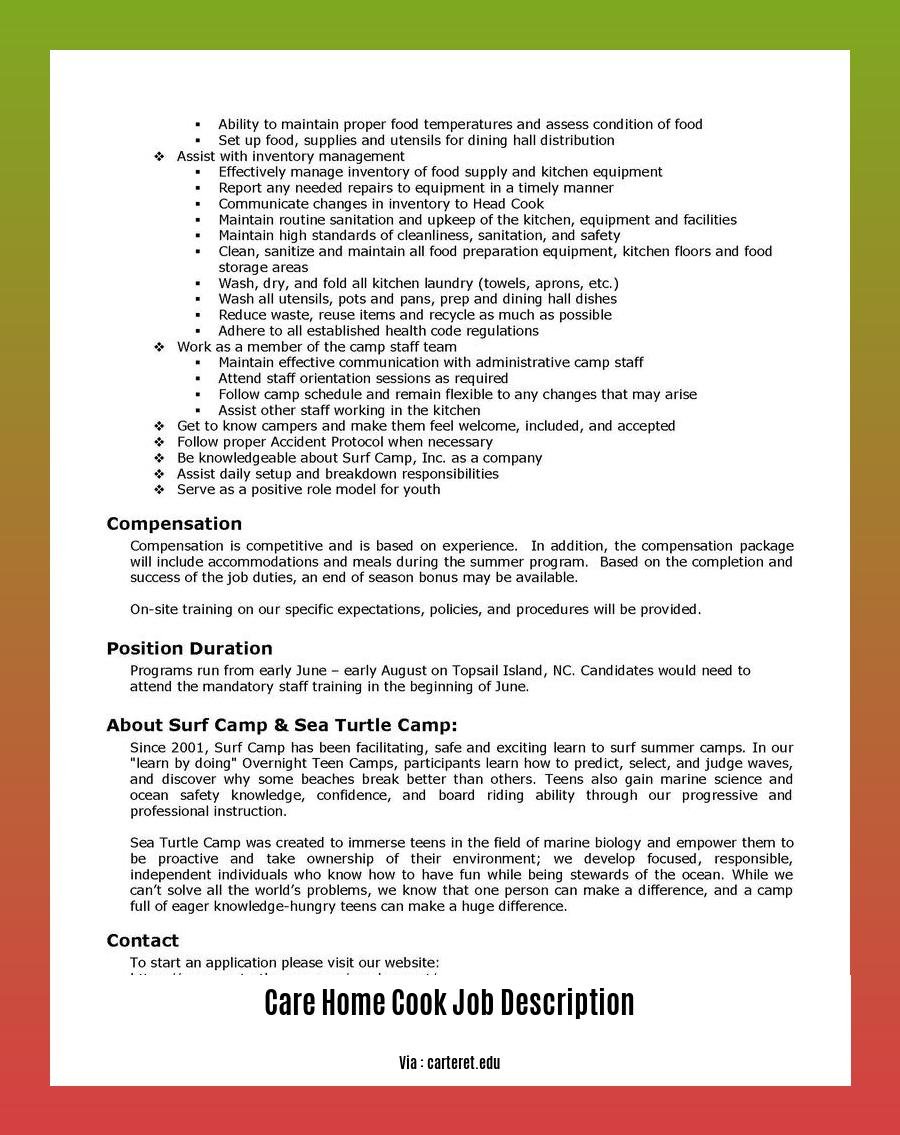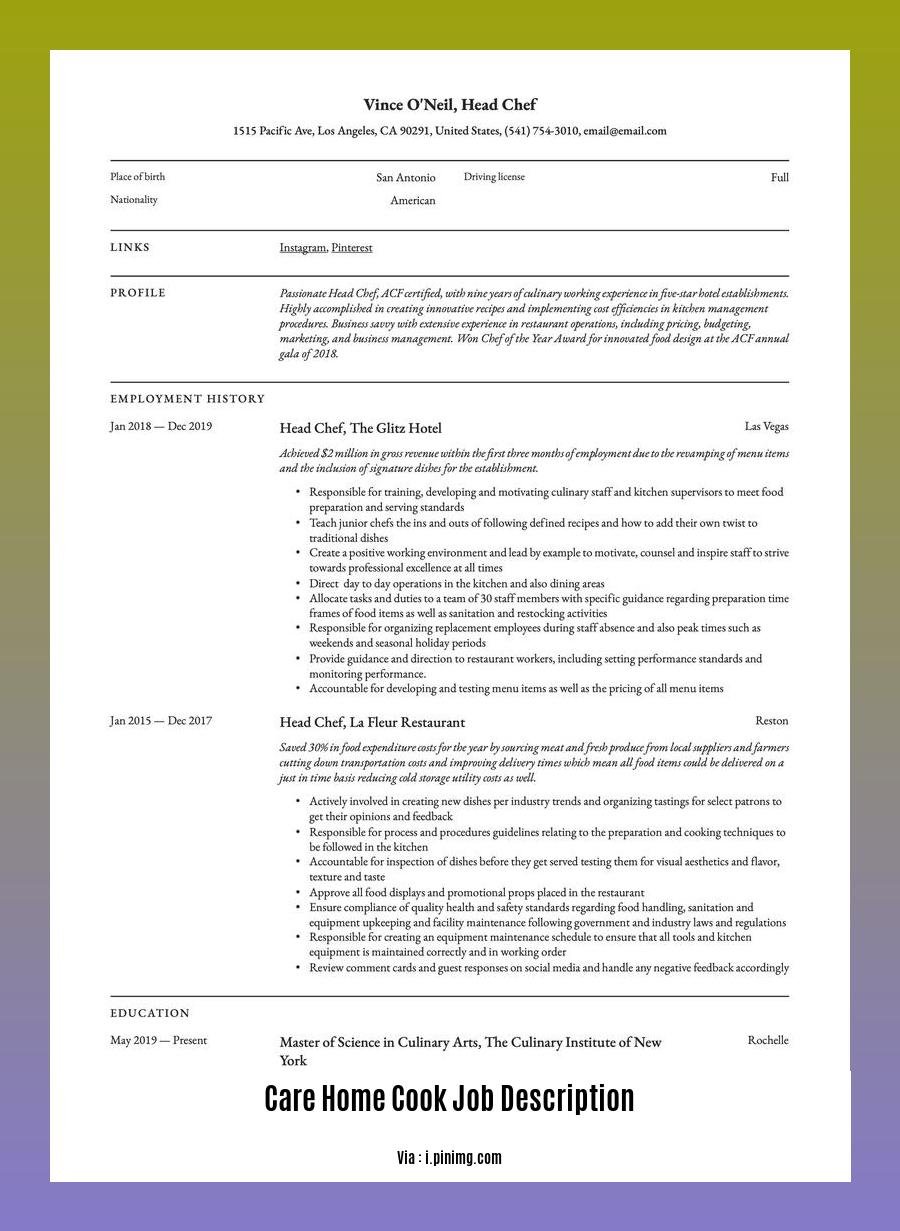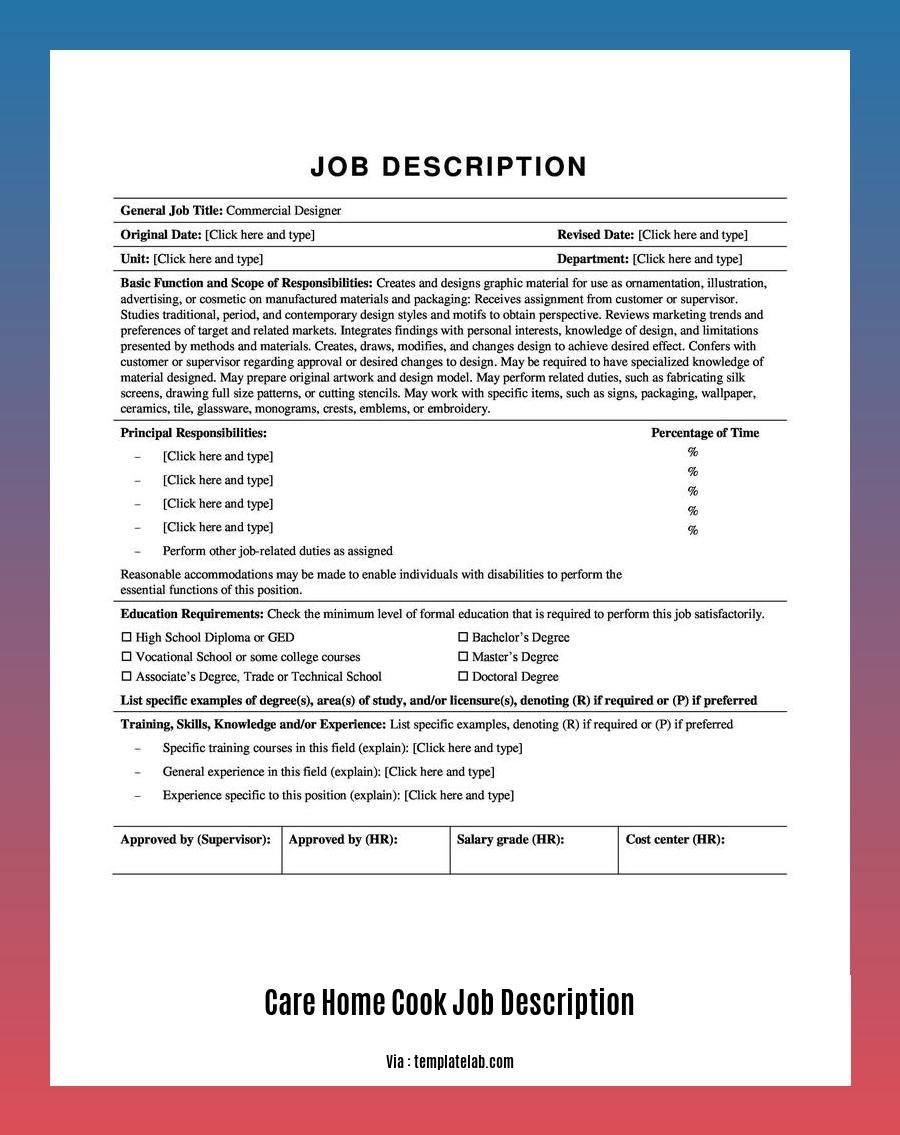Uncover the intricacies of a Care Home Cook’s role in [- Care Home Cook Job Description: Providing Nourishment and Well-being to Elderly Residents]. This comprehensive guide unveils the responsibilities, skills, and qualities that define a successful culinary professional dedicated to enhancing the lives of elderly residents through nutritious and delectable meals.
Key Takeaways:
-
Care home cooks prepare nutritious and balanced meals, considering individual preferences, medical requirements, cultural, and religious factors.
-
They monitor kitchen stocks, place orders, and maintain inventory to ensure a continuous supply of ingredients.
-
Care home cooks uphold high standards of hygiene and cleanliness, following food hygiene regulations.
-
They work with residents to create appealing menus, ensuring variety and meeting minimum standards.
-
Adherence to food safety and hygiene standards, including proper handling and preparation of meals, is crucial.
-
Care home cooks safely and efficiently operate standard kitchen equipment to prepare meals.
Care Home Cook Job Description

A care home cook plays a pivotal role in providing nourishment and ensuring the well-being of elderly residents in care homes. They are responsible for preparing and serving nutritious and appetizing meals that cater to the specific dietary needs and preferences of the residents. This job description delves into the key responsibilities, skills, and qualities sought in a competent care home cook.
Essential Responsibilities:
-
Meal Preparation Expertise: Prepares a variety of nutritious and balanced meals from scratch, ensuring they meet the dietary guidelines and preferences of the residents.
-
Dietary Accommodations: Adapts meals to meet specific dietary requirements, such as dysphagia, allergies, or religious restrictions, ensuring inclusivity and accommodation.
-
Menu Planning and Rotation: Collaborates with residents and staff to create diverse and appealing menus that consider cultural, religious, and personal preferences. Rotates menus regularly to maintain variety and freshness.
-
Kitchen Management: Maintains a clean, organized, and hygienic kitchen environment in compliance with food safety standards. Monitors kitchen stocks and supplies, placing orders and maintaining inventory levels to avoid shortages.
-
Food Safety and Sanitation: Adheres to strict food safety and sanitation protocols to prevent contamination and ensure the safe handling and preparation of meals.
-
Equipment Operation: Demonstrates proficiency in operating various kitchen equipment, such as stoves, ovens, and food processors, to prepare meals efficiently and safely.
-
Communication and Collaboration: Interacts effectively with residents, their families, and the care team to gather feedback, address concerns, and accommodate special requests. Collaborates with other kitchen staff to ensure smooth meal preparation and service.
Required Skills and Qualities:
-
Culinary Expertise: Possesses a strong foundation in culinary arts, with knowledge of nutrition, cooking techniques, and food presentation.
-
Dietary Knowledge: Understands the nutritional needs of elderly residents and can adapt meals to meet specific dietary restrictions and preferences.
-
Food Safety and Hygiene: Demonstrates a commitment to maintaining high standards of hygiene and food safety practices to ensure the well-being of residents.
-
Communication and Interpersonal Skills: Excellent communication and interpersonal skills to interact effectively with residents, their families, and the care team.
-
Flexibility and Adaptability: Adapts easily to changes in menu or dietary requirements and can handle unexpected situations calmly and efficiently.
Why Choose a Career as a Care Home Cook?
-
Job Satisfaction: Providing nutritious meals and contributing to the well-being of elderly residents is a rewarding and fulfilling experience.
-
Stability and Security: Care home cook positions are in high demand, offering job security and stability in a growing industry.
-
Growth Opportunities: Opportunities for career advancement and professional development through specialized training and certifications.
-
Making a Difference: Care home cooks play a vital role in enhancing the quality of life for elderly residents, making a tangible difference in their daily lives.
If you’re passionate about cooking, have a knack for understanding dietary needs, and are committed to providing compassionate care, consider a career as a care home cook. Your culinary skills and dedication can make a meaningful impact on the lives of elderly residents, ensuring their nutritional well-being and overall happiness.
-
If you’re searching for a convenient way to keep your car sparkling effortlessly, look no further than our car cleaning services at home. Our expert team is equipped to deliver a spotless clean right at your doorstep.
-
Explore our care at home jobs to discover a fulfilling career path assisting individuals in the comfort of their own homes. Join our dedicated team and make a positive impact on lives.
-
With years of experience in the industry, we take pride in connecting job seekers with their dream positions. Visit our care at home services recruitment page to uncover employment opportunities that align with your passion for exceptional care.
Work environment and conditions of a care home cook

Alright, let’s dive into the nitty-gritty of what it’s like to be a care home cook, shall we? Picture this: a bustling kitchen, the sizzle of pans, the aroma of roasting chicken filling the air. As a care home cook, you’re the culinary maestro behind the scenes, orchestrating nutritious and delectable meals for elderly residents. But what exactly does this role entail, and what can you expect in terms of your work environment and conditions? Let’s dish it out!
Key Takeaways:
- A Care Home Cook’s Canvas: Care home cooks have the privilege of creating a diverse menu that caters to the dietary needs, preferences, and health conditions of elderly residents. It’s a delightful challenge that calls for culinary creativity and an understanding of special diets.
- Balancing Act: The work environment is a symphony of aromas, flavors, and meticulous attention to detail. Cooks must juggle meal preparation, adhere to strict food safety and hygiene protocols, and maintain a spotless kitchen.
- Teamwork and Collaboration: Care home cooks aren’t lone wolves. They work in tandem with other kitchen staff, nurses, and caretakers to ensure that residents’ nutritional needs are met and that meals are delivered promptly.
- Adaptability and Flexibility: No two days are the same for a care home cook. They must be adaptable to changing resident preferences, last-minute requests, and unexpected dietary restrictions. Flexibility is key to keeping the kitchen running smoothly.
- Communication is Key: Care home cooks are more than just culinary experts. They’re also skilled communicators who interact with residents, families, and healthcare professionals to understand dietary needs, preferences, and any concerns. Clear communication ensures that every meal is tailored to the resident’s well-being.
Citations:
[1] Care Home Cook Job Description
[2] Cook Job Description, Key Duties and Responsibilities
Career prospects and advancement opportunities
In the culinary world, care home cooks play a vital role in providing nutritious and appetizing meals to elderly residents, contributing to their overall well-being. This profession offers a rewarding career path with ample opportunities for growth and advancement.
Key Takeaways:
- Care home cooks can progress to supervisory or management roles within the care home or catering industry.
- Further education and training can open doors to specialized culinary positions, such as therapeutic cooking or dietary consulting.
- Networking with industry professionals and actively seeking professional development opportunities can enhance career prospects.
- Maintaining a positive attitude, adaptability, and commitment to providing exceptional service can lead to career success.
- Exploring entrepreneurial ventures, such as starting a personal chef service or culinary blog, can provide additional income streams and creative outlets.
Climbing the Culinary Ladder
As you gain experience and expertise as a care home cook, you can set your sights on supervisory or management positions within the care home or catering industry. These roles involve overseeing kitchen operations, managing staff, and ensuring the smooth running of the food service department.
Specializing Your Skills
The culinary landscape is vast, and care home cooks can carve out specialized niches for themselves. You could pursue further education or training in therapeutic cooking, which focuses on creating meals that address specific dietary needs and health conditions. Alternatively, you might consider becoming a dietary consultant, offering your expertise to individuals or organizations seeking to improve their nutritional intake.
Networking and Professional Development
Networking is a powerful tool for career advancement in any field, and the culinary world is no exception. Attend industry events, join professional organizations, and connect with fellow chefs and food enthusiasts. These connections can lead to new job opportunities, collaborations, and valuable insights into the latest culinary trends.
Maintaining a Winning Attitude
In the fast-paced and demanding world of care home cooking, a positive attitude and adaptability are essential. Be willing to learn new skills, embrace challenges, and work collaboratively with your team. A commitment to providing exceptional service to the residents you serve will set you apart as a dedicated and compassionate professional.
Exploring Entrepreneurial Opportunities
If you have a passion for cooking and a knack for entrepreneurship, you might consider starting your own personal chef service or culinary blog. These ventures can provide additional income streams, creative outlets, and the opportunity to share your culinary expertise with a broader audience.
Sources:
1. Care Home Cook Job Description – Best Career Guide
2. Cook Responsibilities, Job Description, and Requirements – Jobcase
Tips for becoming a successful care home cook
In a caregiving environment, ensuring the well-being of elderly residents begins with nourishing meals prepared with love and expertise. Success as a Care Home Cook demands not just culinary skills but also empathy, patience, and an understanding of specialized dietary needs. Let’s delve into key tips for thriving in this meaningful role.
Key Points:
-
Master the art of meal preparation: Prepare balanced and nutritious meals adhering to dietary guidelines and specific resident preferences.
-
Become a culinary chameleon: Adapt recipes to meet the needs of individuals with diverse cultural backgrounds, allergies, and medical conditions.
-
Maintain a spotless kitchen: Uphold the highest standards of hygiene and sanitation to ensure food safety and prevent contamination.
-
Nurture relationships with residents and staff: Foster positive connections by engaging in friendly conversations, actively listening to concerns, and going the extra mile to make mealtimes enjoyable.
-
Embrace continuous learning: Stay updated on the latest advancements in nutrition and culinary techniques through workshops, seminars, and online resources.
Professional Development:
-
Earn Relevant Certifications: Consider obtaining certifications in food safety, nutrition, and specialized diets to enhance your credibility and skills.
-
Network with Fellow Cooks: Join local culinary groups and attend industry events to connect with peers, share experiences, and stay abreast of industry trends.
Additional Tips:
-
Be flexible and adaptable: Caregiving environments are dynamic, so be prepared to adjust menus and cooking schedules as needed.
-
Cultivate teamwork: Collaborate effectively with dietary staff, nurses, and caregivers to ensure a cohesive approach to resident care.
-
Communicate effectively: Maintain clear and regular communication with residents, families, and healthcare professionals to address dietary concerns and preferences promptly.
Key Takeaways:
- Master meal preparation: Balance nutrition with taste, considering individual preferences and restrictions.
- Maintain kitchen hygiene: Prioritize cleanliness to ensure food safety.
- Build relationships: Engage with residents, families, and staff to create positive mealtime experiences.
- Embrace learning: Stay updated on nutrition and culinary advancements through ongoing education.
Relevant Sources:
- How to Become a Care Home Cook: Step-by-Step Guide
- Top 10 Tips for Becoming a Successful Care Home Cook
FAQ
Q1: What are the primary responsibilities of a care home cook?
A1: Care home cooks are responsible for preparing and delivering nutritious and appetizing meals to elderly residents, catering to their diverse dietary needs and preferences. They ensure that meals are balanced, safe, and presented in an appealing manner.
Q2: How do care home cooks address the specific dietary requirements of residents?
A2: Care home cooks work closely with residents, their families, and healthcare professionals to understand and accommodate individual dietary requirements. They create meals that adhere to medical guidelines, ensuring that residents with dysphagia, allergies, or other health conditions receive appropriate nourishment.
Q3: How do care home cooks ensure food safety and hygiene standards?
A3: Care home cooks uphold high standards of food safety and hygiene in the kitchen. They follow established food hygiene regulations, maintain cleanliness, and adhere to HACCP protocols to prevent contamination and ensure the safe handling and preparation of meals.
Q4: How do care home cooks incorporate cultural and religious considerations into their menu planning?
A4: Care home cooks recognize the diverse cultural and religious backgrounds of residents. They work with residents and their families to understand and respect their dietary preferences and restrictions. They strive to create menus that reflect cultural diversity and accommodate religious observances.
Q5: How do care home cooks collaborate with other healthcare professionals to ensure the well-being of residents?
A5: Care home cooks work in collaboration with dietitians, nurses, and other healthcare professionals to ensure that residents’ nutritional needs are met. They share information about residents’ dietary preferences, allergies, and medical conditions, and work together to develop personalized meal plans that support their overall well-being.
- Gray Kitchen Backsplash Tile: Ideas for a Stylish Upgrade - December 14, 2025
- Backsplash For Gray Cabinets: Choosing the Right Backsplash Style - December 13, 2025
- Gray And White Backsplash: Ideas For Timeless Style - December 12, 2025









